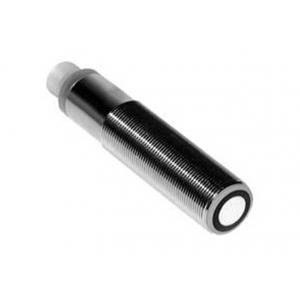
Add to Cart
External Synchronization Adjustable Ultrasonic Proximity Sensor With 255 KHz Transducer
Description
Brife introduction of ultrasonic sensor
Ultrasonic sensors present the ideal solution for non-contact position and distance measurement in all industrial areas where environmental conditions such as dust, smoke or steam may affect the sensors. Objects consisting of a variety of materials can be detected to within millimeters regardless of color or shape.
The ultrasonic sensor produces a data carrier utilizing very high frequencies that are outside the human’s audible range. The time it takes for that ultrasonic wave to pass between the sensor and the object is the value for the distance or the position.
Technical data
| data |
| General Specifications |
| Sensing distance: 70…1000mm |
| Adjustment range: 90…1000mm |
| Unusable area: 0…70mm |
| Standard target plate: 100mm×100mm |
| Transducer frequency: About 255 kHz |
| Response delay: About 125ms |
| Indicators/Operating means |
| LED blue Power on |
| LED yellow indication of the switching state Flashing:program function object detected |
| LED red permanently red: Error Red,flashing:program function,object not detected |
| Electrical specifications |
| Operating voltage UB: 10…30VDC,ripple10%ss |
| No-load supply current: ≤45mA |
| Output |
| Output type : 1 analogue output 4.....20mA |
| Resolution: 0.35mm at max.sensing range |
| Deviation of the characteristic curve ±1% of full-scale value |
| Repeat accuracy : ±0.1% of full-scale value |
| Load impedance 0-300 Ohm |
| Temperature influence: ±1.5% of full-scale value |
| Ambient conditions |
| Ambient temperature: -25…70°C |
| Storage temperature: -40…85°C |
| Mechanical specifications
|
| Protection grade: IP67 |
| Connection: Connector M12x1,4-PIN |
| Material Housing: brass,nickel-plated |
| Transducer epoxy resin/hollow glass sphere mixture; Polyurethane foam |
| Weight 60g |
External synchronization
The sensor can be synchronised by the external application of a square wave voltage. A synchronisation pulse at the
synchronisation
input starts a measuring cycle. The pulse must have a duration greater than 100 μs. The measuring cycle starts with
the falling edge of a synchronisation pulse. A low level > 1 s or an open synchronisation input will result in the normal
operation
of the sensor. A high level at the synchronisation input disables the sensor. Two operating modes are available:
1. Multiple sensors can be controlled by the same synchronisation signal. The sensors are synchronised.
2. The synchronisation pulses are sent cyclically to individual sensors. The sensors operate in multiplex mode.
Internal synchronization
The synchronisation connections of up to 5 sensors capable of internal synchronisation are connected to one another. When
power is applied, these sensors will operate in multiplex mode.
The response delay increases according to the number of sensors to be synchronised. Synchronisation cannot be performed
during TEACH-IN and vice versa. The sensors must be operated in an unsynchronised manner to teach the evaluation limits.
Dimensions

Product picture

Q: How to order our product ?
A:1). Please tell us the model and quantity and other request you need.
2). We make the PI for you.
3). After you confirm the PI, we arrange the order for you after receiving your payment.
4). After the goods finished, we send the goods out to you and tell you the tracking number.
5). We will track your goods until you receive the goods.
Q: What's your warranty ?
A: Two years
Q: What's your shipment method?
A: We ship by Express, by air, by sea, by train. Normally we checked and compare, then provide customer the most proper shipment method.
Q: What's about MOQ?
A: First order MOQ=1pcs
Q: If i want to release order, what's the payment method you accept ?
A: We accept T/T, Paypal, Western union, L/C.
Q: If i want to release order, what's the process?
A: Thanks. You can send inquiry to us by Maoyt or send us by email, we will reply within 24hrs.